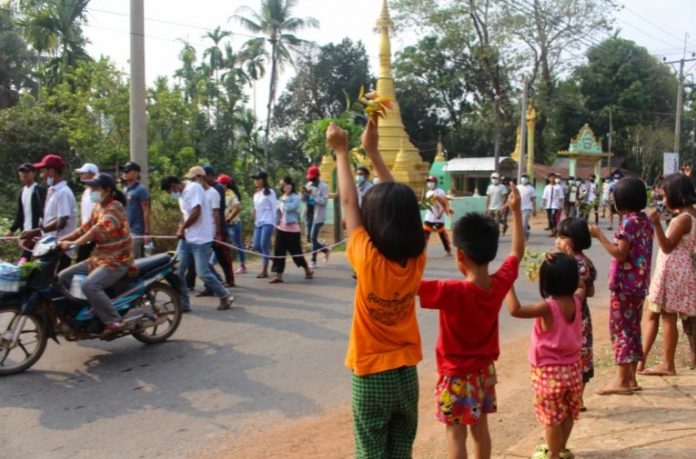Myanmar’s economy has suffered considerably since the February 2021 coup and the prospects of recovery are dwindling given the ham-handed economic mismanagement of the ruling regime.
19 months after the 1 February 2021 coup, the head of the State Administration Council (SAC) military regime in Myanmar, Senior General Min Aung Hlaing, attended the Eastern Economic Forum in Vladivostok, Russia. Myanmar state media reports on the forum showed images of the Senior General confidently meeting his Russian counterparts and visiting places of interest. In reality, his regime is facing a huge challenge at home—a worsening economic crisis adding to the impact of dealing with armed resistance movements and political opponents.
In Myanmar today, bankers, taxi drivers and housewives alike are struggling with runaway inflation and consumer prices. Before the coup, one U.S. dollar (US$1) was worth about 1,300 Myanmar kyat officially. Since the coup, the kyat has been effectively devalued by about 30 per cent and informal exchange rates have fluctuated wildly, especially after the Central Bank of Myanmar (CBM) weakened the kyat in August 2022 to 2100 kyat per U.S. dollar. By early September 2022, the going (albeit informal) rate was 4,500 kyat per dollar. Adding to the confusion, informal currency exchange transactions take place online. These online groups run mainly on Facebook and quote exchange rates that are higher than actual market rates, with some as high as 5000 kyat per U.S. dollar. This has resulted in “three types of currency exchange rates in Myanmar now – Central Bank rate, market rate and Facebook rate,” quipped Ko Naing, a former editor at a private news media in Yangon.
Commodity prices have also dramatically increased by up to 57 per cent for some basic commodities. The Myanmar populace is suffering from the combined effects of political instability and a steadily worsening economic situation over 19 months. “The cost of ten eggs was 1,100 kyat before the coup, it is now 1,900 kyat,” said Daw Amar, a retired government staffer in Yangon. “My money has gone with the wind”.
The coup has created a financial crisis since Day One. The military regime cut phone and internet lines shortly after announcing the coup, disrupting all ATM services across the country. When internet service was restored, panicked people flocked en masse to ATMs. The regime responded by limiting withdrawals from ATMs or bank counters, from an initial limit of 500,000 kyat per person per day to 200,000 kyat, then just 100,000 kyat, fueling further panic. Myanmar citizens continue to face challenges in accessing their own cash.
The coup makers refuse to admit that there is an ongoing economic crisis, however.
The regime clumsily attempted to stabilise the economy by inviting new investment projects. It re-organised the Myanmar Investment Commission (MIC) on 4 March 2021, appointing Min Aung Hlaing’s protégé, Lieutenant-General Moe Myint Tun, as MIC chairman. Moe Myint Tun’s first decision as MIC chair was reportedly to “approve US$579 million” worth of projects and to create 945 jobs. With his family connections to General Maung Aye, the previous military regime’s second-in-command, Moe Myint Tun owes his rise to his administrative accomplishments at the War Office and is one of the youngest generals in recent history. However, he lacks experience in managing the economy. Moe Myint Tun’s MIC position and other new appointments or reshuffles made in August 2022 can be seen as the SAC’s moves to reward close allies and tighten ranks.
Leading businessmen have shared that the regime had hoped to counter Western sanctions by looking to China for billion-dollar capital injections. This hope for financial rescue from China did not materialise. Whether it was due to Beijing’s unhappiness over the coup that ousted Daw Aung San Suu Kyi’s government or concerns over Myanmar’s current political instability, China has not made any bailout move apart from providing some humanitarian assistance and Covid-19 diplomacy. Chinese investments have also declined. Myanmar official data lists Chinese investments in Myanmar at more than US$6.6 billion during the National League for Democracy (NLD) government’s time in office, but by 2021, investments had decreased to US$175.8 million. During the NLD administration, China invested an estimated US$1.5 billion in Yangon, Myanmar’s largest city and commercial hub. In sharp contrast, a Myanmar military source shared there is “nothing now”.
Myanmar has made no significant exports since February 2021 and foreign investors have either left or are considering leaving the country. Myanmar’s moneyed classes have also been moving cash out of the country through formal and informal channels. Speaking anonymously, a former staff of a Japanese bank branch in Myanmar shared that the rich in Myanmar have moved up to an estimated 80 per cent of their wealth to Thailand, Dubai and Singapore, with some of that wealth converted to property. Thailand’s Real Estate Information Center reports that Burmese are now the second largest foreign buyers of condominiums in the kingdom, after the Chinese.
The coup makers refuse to admit that there is an ongoing economic crisis, however. The CBM and Myanmar state-run media still list the CBM’s official rate of 2100 kyat per US$1. On 11 August 2022, Min Aung Hlaing even vowed to “develop Myanmar’s economy within six months”.
The coup and resultant uncertainty about Myanmar’s future have triggered de facto economic collapse. Due to mismanagement, the hardline military regime’s attempts to invite investment and to control the kyat and foreign exchange outflows are the opposite of moving Myanmar’s economy forward./ BY WAI MOE/ FULCRUM




